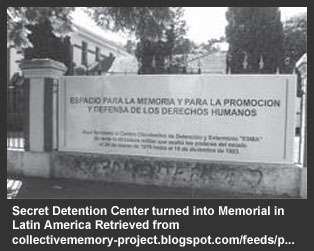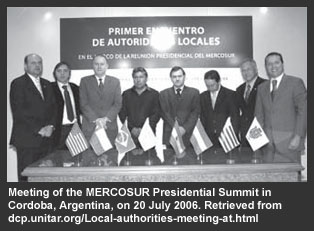Most political observers are in agreement that it is
not business as usual in Latin America, once considered USA´s “backyard.”
On the contrary, for the last decade or more, waves of change have swept
the region especially in South America so that another metaphor will have
to be coined to describe the new political and economic reality of the
emerging hemisphere. While not yet a full-fledged independent neighbor,
Latin America is increasingly evolving its own dynamics separate from the
US and Canada and this process is giving a radically new identity to the
region. Indeed, the infamous wall which the Bush administration is now
constructing along the Mexican border ostensibly to keep unwanted Latino
immigrants out from the US is becoming a powerful symbol of separateness
where beyond the wall, Latin America itself is building its own
distinctive politico social reality beyond the surveillance of big daddy,
USA.
 The
creation of MERCOSUR in 1991 - a common market between Brazil, Argentina,
Paraguay and Uruguay heralded a new economic departure for the South.
While the US, Canada and Mexico embarked on the North American Free Trade
Agreement (NAFTA), this new protective region to the South has become a
focus point for a separate development. It has grown so as to catapult
Brazil into becoming the 10th economic power of the world.
The
creation of MERCOSUR in 1991 - a common market between Brazil, Argentina,
Paraguay and Uruguay heralded a new economic departure for the South.
While the US, Canada and Mexico embarked on the North American Free Trade
Agreement (NAFTA), this new protective region to the South has become a
focus point for a separate development. It has grown so as to catapult
Brazil into becoming the 10th economic power of the world.
However, it was not only this pooling of resources
among neighbors that gave a decisive impulse to the region. Almost
simultaneously, all the MERCOSUR countries underwent such chaotic
socio-economic crises in the nineties, largely due to the application of
the neo-liberal IMF free trade model in which they were forced to explore
other development models wherein the state takes on a central role.
“Another World is Possible,” the slogan of the first World Social Forum in
Brazil (2000) began to take on real existence. The 2001 collapse of
Argentina is a good example but that economic implosion had already
transpired in Venezuela and was the backdrop of the first election as
President of former military officer Hugo Chavez. Evo Morales, the first
indigenous American ever to be elected president, is now leading Bolivia
after much turmoil under IMF sponsored policies. The transformation
policies of Morales are shaking that country to its roots as the
traditional elites see their privileged positions threatened for the first
time in history. Paraguay under former Catholic bishop Fernando Lugo, now
elected President, is beginning to trod on a similar road searching for a
more equitable and sustainable model of development that is distinctly
different from the neo-liberal model broached by US-sponsored institutions
such as the IMF and the World Bank. Meanwhile, the US, Canada and Mexico
continue to espouse free market principles although the recent financial
crisis on Wall Street has seen the massive intervention of the US
government to save the economy in a move that has been branded as
“nationalization” or “US socialism.” Whatever the final outcome, Latin
America will undoubtedly continue its own distinctive way for the
foreseeable future.
 In
short, Latin Americans are searching for a new model of social economic
development which will finally address the endemic ill of the continent
which is social inequality, that is, the tremendous gap dividing the haves
and the have–nots or the rich classes from the poor majority. The news
that significant advances have been made in terms of social and economic
rights in countries such as Venezuela, Brazil and even Argentina shows
that positive fruits can be harvested from these new policies. But it is
true that there is a backlash from the conservative, oligarchic elites
allied with the US who see their status threatened and above all, have a
powerful weapon at their disposal which is the control of the media. Mass
media influences public opinion and is the major force installing
political figures, who in the name of law and order, seek to roll back new
progressive policies.
In
short, Latin Americans are searching for a new model of social economic
development which will finally address the endemic ill of the continent
which is social inequality, that is, the tremendous gap dividing the haves
and the have–nots or the rich classes from the poor majority. The news
that significant advances have been made in terms of social and economic
rights in countries such as Venezuela, Brazil and even Argentina shows
that positive fruits can be harvested from these new policies. But it is
true that there is a backlash from the conservative, oligarchic elites
allied with the US who see their status threatened and above all, have a
powerful weapon at their disposal which is the control of the media. Mass
media influences public opinion and is the major force installing
political figures, who in the name of law and order, seek to roll back new
progressive policies.
The response is participative democracy expressed in plebiscites and
referenda such as the recent ones held in Bolivia and Ecuador. Here, the
population are mobilized in support of the new policies whereas sometimes
in local city or provincial elections, the traditional sectors can still
hold forth as happened in Buenos Aires city where the mayor now is a
conservative businessman Mauricio Macri who is intent on rolling back all
progressive policies here by privatizing key sectors of life. This virtual
war with entrenched conservative elites will be the backdrop of many
future conflicts in the region.
The Struggle Against Impunity
The other fundamental feature of this new Latin American identity is
the priority given to human rights and specifically the struggle
against impunity. Whereas the US has retrenched into anti- uman rights
rhetoric and practices under Bush, justifying such positions in the
aftermath of 9- 11 as necessary tools for the global war on terrorism, in
South America, impunity laws for perpetrators of human rights violations
committed during past US-sponsored military dictatorships have been
overturned. For instance, in Argentina, Chile, Uruguay, Brazil, Peru,
Bolivia and Paraguay, human rights trials have begun wherein perpetrators
of crimes committed more than 30 years ago have now to respond for their
criminal acts in the court room. It is pathetic to hear these aged
perpetrators vent their hatred and denouncements of subversion and
communism in order to justify torture, assassinations and enforced
disappearances. The doctrine of “crime against humanity” is invoked to
continue the prosecutions after statuary limitations and the wall of
impunity has finally been breached. Even in Peru, a former democratically
elected president Alberto Fujimori was extradited from Chile and his trial
for charges of corruption and cases of enforced disappearances has begun
in Lima.
In many countries, former secret detention centers have been converted
into memorial sites and files coming from that period of Latin American
history are being collected into special memorial archives. Reparation and
compensation programs for victims and their families are in place.
Undoubtedly much still needs to be done in meeting all
the demands of the Latin American families of the disappeared but the way
ahead is now clear and the major task is to ensure that this positive
process continues and full responses are given. New cases of enforced
disappearances still occur in countries such as Mexico and Colombia (both
are still havens for US-sponsored antiterrorism doctrines) but all
self-respecting democracies in the region know that it is their obligation
to fight impunity and combat all enforced disappearances in whatever form
or shape. This state of affairs has been a major achievement of the
Latin American human rights movement. It permits us to move on to the
other substantial part of any human rights agenda which is the enjoyment
by common people of their full economic, social and cultural rights. Far
from over, the fight for the full enactment of the Universal Declaration
of Human Rights 60 years after its proclamation has only begun in Latin
America.
